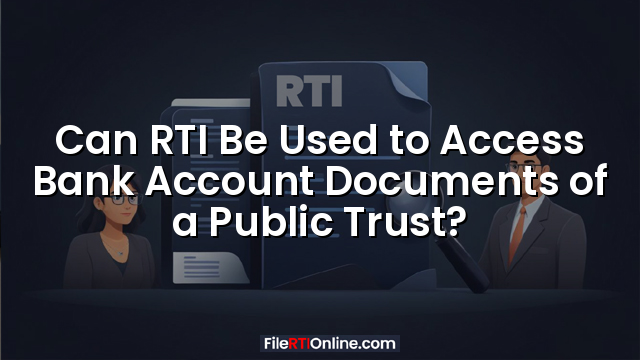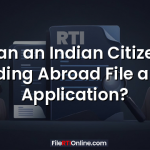One of the most debated questions under the Right to Information Act is whether the financial documents of public trusts, NGOs, societies, or charitable institutions—especially those holding public funds—can be accessed through RTI. Citizens often believe that because such bodies serve the public, their financial dealings must be fully transparent.
However, when these institutions hold bank accounts in commercial banks, the rules of banking confidentiality, fiduciary obligations, and privacy still apply.
This article explains the extent to which RTI can be used to obtain bank-related documents of a public trust, using a real Central Information Commission (CIC) case as an example.
Background: RTI Application Seeking Account-Opening Documents of a Public Trust
An appellant filed an RTI with Syndicate Bank requesting:
- Copies of documents submitted public trust at the time of opening its bank account
- Other related information about that trust’s account
The PIO denied the information under Section 8(1)(d) of the RTI Act, which protects information containing commercial confidence, trade secrets, or information held in fiduciary capacity, unless larger public interest justifies disclosure.
What Happened During the CIC Hearing?
During the hearing:
Appellant’s Position
- The trust is a public trust, not a private body.
- Therefore, its account documents should be open to public scrutiny.
- He claimed the trust allegedly opened the account without proper paperwork, making disclosure necessary.
Respondent Bank’s Position
- Even if the trust is a public trust, once it becomes a customer of the bank, it is entitled to banking confidentiality.
- Banks hold customer documents in a fiduciary relationship, protected under Section 8(1)(d).
- The appellant was a stranger to the trust and had no legal relationship or authority to access those documents.
CIC’s Decision
The Central Information Commission upheld the decision of the PIO and rejected the appeal.
The reasoning was:
- Banks maintain account-opening documents in a fiduciary capacity, and fiduciary information is protected under Section 8(1)(d).
- Disclosure of a customer’s documents—whether of a private person, company, or public trust—would breach confidentiality.
- There was no demonstrated larger public interest strong enough to override the exemption.
What This Means: RTI Cannot Be Used to Access Bank Records of Public Trusts
Even though public trusts operate in public interest, their bank accounts are governed by:
- Banking laws
- Contractual obligations
- Customer confidentiality
- Fiduciary duties of banks
Therefore:
RTI cannot be used to seek:
- Account-opening forms
- KYC documents
- PAN/Aadhaar submitted
- Bank statements
- Copies of resolutions
- Correspondence between the bank and the trust
These remain confidential unless:
- You are legally connected to the trust, or
- You obtain consent from the trust itself, or
- A court orders disclosure
Can Financial Data of Public Trusts Ever Be Disclosed?
Yes, but from the trust itself, not the bank.
You can file RTI to the public authority (if the trust is substantially funded government) to seek:
- Audited accounts
- Grants received
- Utilization certificates
- Registration documents
- Annual reports
But the bank’s internal documents are protected.
When Can Such Information Be Disclosed?
Disclosure may be possible only if:
- The trust misuses public funds, and
- There is overwhelming larger public interest, and
- The authority holding the information is itself a public authority (not a commercial bank)
Even then, CIC decisions are cautious in overriding banking confidentiality.
Key Takeaways
- A public trust does not lose its banking privacy merely because it serves the public.
- Banks hold customer documents in a fiduciary capacity protected under Section 8(1)(d).
- RTI cannot compel disclosure of bank account-opening documents of third parties—individuals, companies, NGOs, or trusts.
- To obtain financial transparency of public trusts, RTI must be filed with the trust or the government department overseeing it, not the bank.


